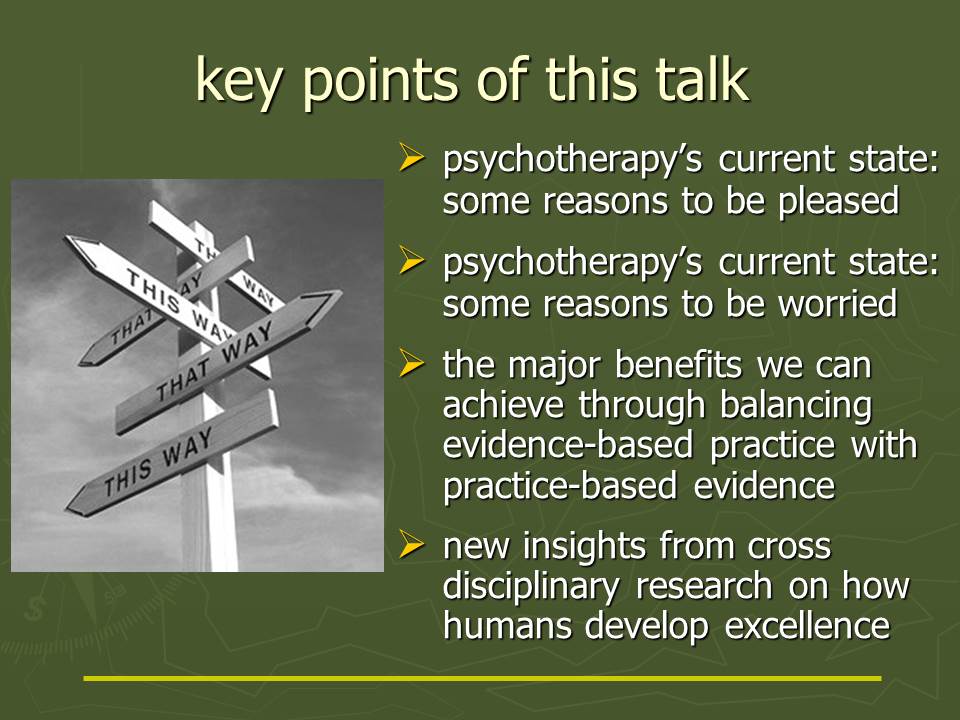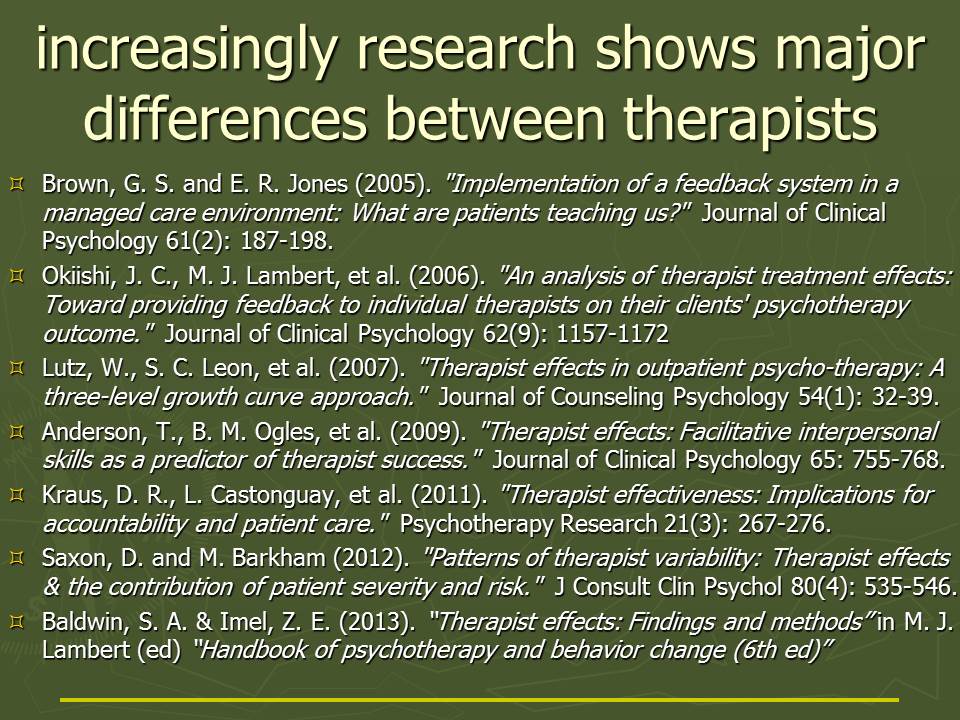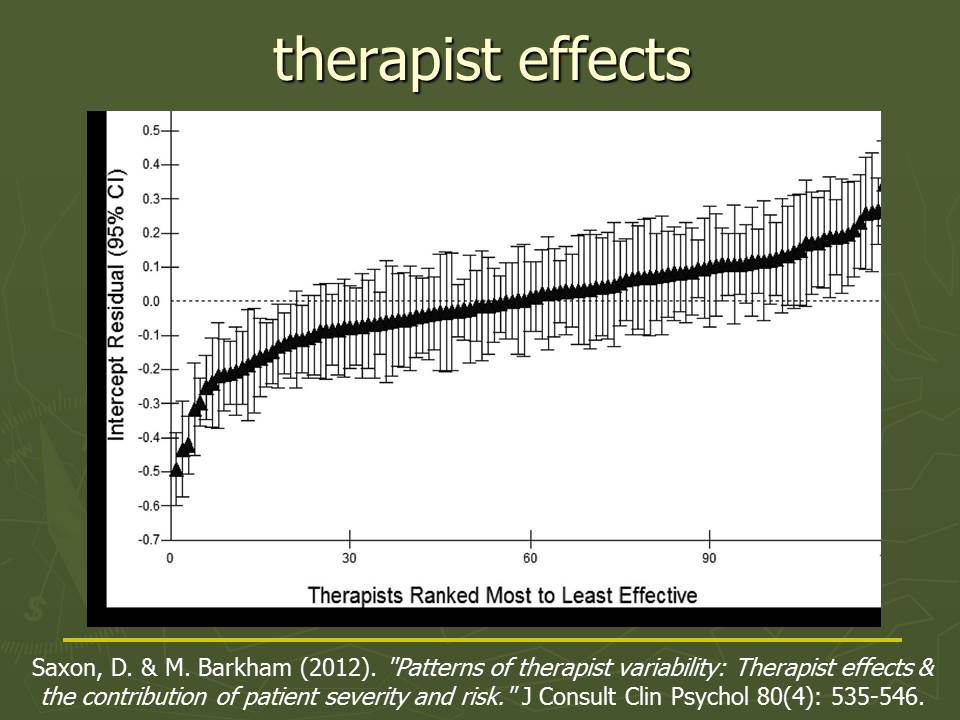Melbourne lecture: "How can we help our clients more effectively?" - the current worrying situation
Last updated on 28th August 2014
(the full 48 slide Powerpoint lecture can be downloaded by clicking here)
I gave a lecture in Melbourne today entitled "How can we help our clients more effectively?" An initial slide highlighted the main points I covered:

I talked about the many meta-analyses that have documented psychotherapy's effectiveness, but went on to express disappointment at the poor track record we have over the last forty years in improving the outcomes we achieve - see the chapter on "The efficacy and effectiveness of psychotherapy" in this year's 6th edition of "The handbook of psychotherapy and behaviour change" . This was something I discussed in more detail a couple of years ago on this blog after hearing Lars-Goran Ost lecture on how little change there has been in CBT outcomes when treating anxiety disorders - see "BABCP spring meeting: the conference - an overview & why no uproar (over Ost's findings)?" There is a similar situation in depression treatment as well, e.g. the post "Discussion on the Dodo assertion - all good depression treatments are equally effective". Like Ost, I think there are occasional examples of movement forward (for example developments in CBT treatment of social anxiety disorder), but overall the huge amounts of effort put into producing yet further approaches to treatment have yielded very few gains. In this situation it makes extremely good sense to step back and consider whether there may be fresh approaches that would help to break this "log jam". One obvious area that emerges, if one broadens one's perspective on how to help clients more effectively, is to consider why there are large variations in the results obtained by different therapists (rather than by different therapies). This is very much the territory Michael Lambert ventured into in a game-changing lecture I attended a couple of years ago - "Guildford BABCP conference: what shall we do about the fact that there are supershrinks and pseudoshrinks?"
I say the lecture was "game-changing" because I reacted to it with quite a "convulsion" of activity aimed at exploring more fully the ideas Michael had introduced. A key insight here is that a surprisingly effective way of increasing the helpfulness of therapists is to provide them (and their clients) with session-by-session feedback on how effective the therapy is actually being. This encourages much quicker alterations in approach & discussion of alliance difficulties, which in turn is linked to improved outcomes. Initially less effective therapists in particular seem to gain from these innovations and may well start to get results that approach the benefits being provided by initially more effective therapists. Several studies suggest that this provision of "practice-based evidence" boosts the overall effectiveness of therapy considerably more than one would be likely to achieve by learning yet another new therapeutic approach. As I wrote in my final blog post about that July conference - "Supershrinks & pseudoshrinks: OK, I'm quite fast out of the blocks on this one. After the conference I got myself copies of the key papers "Using formal client feedback to improve retention and outcomes", "Using client feedback to improve couple therapy outcomes: a randomized clinical trial in a naturalistic setting", "Does a continuous feedback system improve psychotherapy outcome?" & "Effect of client feedback on couple psychotherapy outcomes". I've joined the Center for Clinical Excellence and I've booked myself into a two day workshop in Copenhagen in mid-September to hear Scott Miller present on "The heart and soul of change" - a workshop on how to implement simple session-by-session client feedback on therapeutic progress and the therapeutic alliance. Meanwhile I've downloaded and begun to experiment with the quick four item "Outcome Rating Scale (ORS) & Session Rating Scale (SRS)"."
The next month I had got hold of and wrote blog posts about the books "On becoming a better therapist", "The heart & soul of change" and "How psychotherapists develop" as well as a post on the key research paper "The Norway feedback project". And by the month after I was apparently the only non-Scandinavian participant at a two day workshop on feedback-informed therapy with Scott Miller in Copenhagen. Busy times! If you click on "feedback" in the tag cloud it will bring up twenty or so blog posts that I've written about this territory over the last couple of years, including reports on a three day "Achieving clinical excellence" conference with Anders Ericsson in Amsterdam I went to just three months ago. I guess lecturing on issues brought up by this exploration is a pretty natural progression, and the lectures by Lars-Goran Ost, by Michael Lambert, and by Anders Ericsson have been three key stepping stones on this journey. My gratitude to all three of them for sharing the fine work they have done. And emerging research increasingly shows that effectiveness differences between therapists are regularly greater than differences between therapies:


Tomorrow I'll write a further post on this lecture exploring the encouraging results being produced by adding practice-based evidence (feedback on how clients are doing) to evidence-based practice.
(the full 48 slide Powerpoint lecture can be downloaded by clicking here)
| Attachment | Size |
|---|---|
| how help more effectively lecture, blog 3.jpg | 79.16 KB |
| how help more effectively lecture.ppt | 2.63 MB |
| how help more effectively lecture, blog 2.jpg | 156.87 KB |
| how help more effectively lecture, blog 1.jpg | 89.96 KB |
